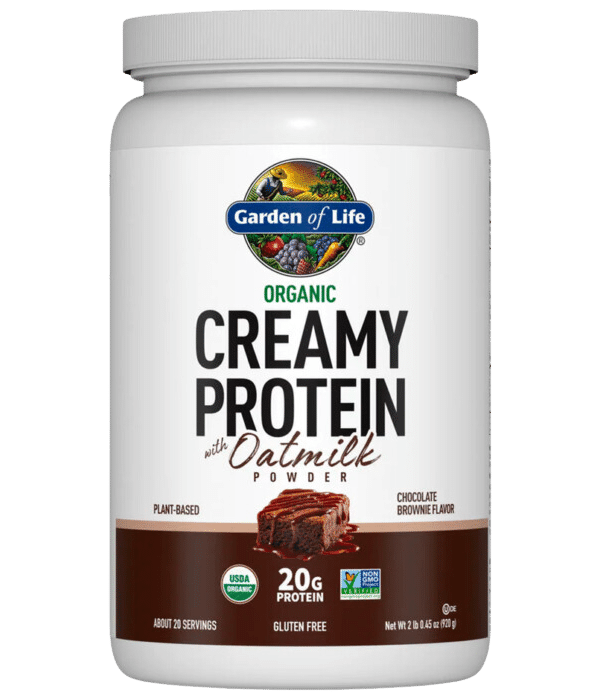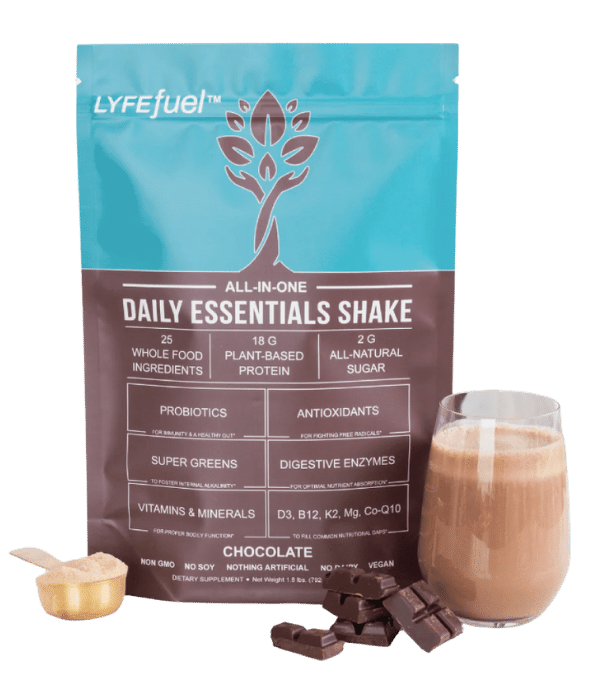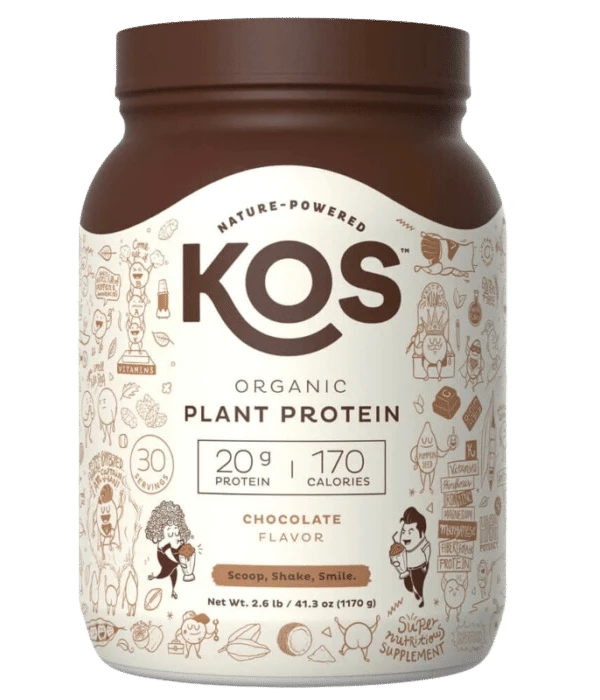Try our favorite, clean protein powder: See our top pick →
Try our favorite, clean protein powder: See our top pick →
This post contains links through which we may earn a small commission should you make a purchase from a brand. This in no way affects our ability to objectively critique the products and brands we review.
Evidence Based Research To fulfill our commitment to bringing our audience accurate and insightful content, our expert writers and medical reviewers rely on carefully curated research.
Read Our Editorial Policy
“But you won’t get any protein!” Sigh. Even before the advent of vegan-friendly protein powders, vegans had plenty of healthy protein sources to choose from, like quinoa, tofu, oats, and more.
However, not all protein is created equal, and it’s true that the vegan diet is more likely to fall short when it comes to lysine and other limiting amino acids.
To meet that need (and placate your concerned friends/relatives), here’s our list of the 5 best vegan protein powders on the market today.
We balanced price, nutritional density, essential amino acid profile, and taste when establishing our top picks—Garden of Life Organic Creamy Protein for the win, by the way.
Without further ado, here’s your buyer’s guide to the top vegan protein powders on the market.
Best Overall | All-in-One | Budget Pick | |
|---|---|---|---|
| Product | Garden of Life | LYFE Fuel | KOS Organic |
| Protein | 20g | 18g | 20g |
| Price | $2.25/serving Shop Now | $2.91/serving Shop Now | $1.67/serving Shop Now |
Best for: Vegans looking to supplement both protein and iron with a whole-food based supplement.
As always, Garden of Life has to passively throw shade on their competitors with USDA organic products using a palette of whole-food-based ingredients.
Their Creamy Protein with Oat Milk is no exception, thanks to sprouted organic protein and prebiotic/probiotic blends featuring sprouted amaranth, quinoa, chia, Bacillus subtilis (250 million CFU), and more.
Thanks to this ingredient quality and variety, Garden of Life Organic Creamy Protein with Oat Milk provides 6 grams of fiber, 20 grams of protein, and a generous 6.5 milligrams of iron per scoop.
This protein shake does contain erythritol and natural flavors, but they’re both organic, and the organic cocoa powder improves the taste.
And though the sodium isn’t egregiously high for those who can budget for it (350 mg per serving), it’s still well above the average.
Otherwise, Garden of Life Creamy Protein with Oat Milk is definitely the most nutritionally well-rounded, USDA Organic vegan protein powder we’ve reviewed.
Best for: People looking for a comprehensive vegan protein powder with vitamins, minerals, greens, probiotics, and superfoods.
LYFE Fuel Daily Essentials Nutrition Shake is a comprehensive, all-in-one vegan protein powder complete with micronutrients, greens, antioxidants, berries, digestive support, and more.
Rather than taking many separate supplements and powders, LYFE Fuel helps you fill nutrient gaps and fuel your day by getting everything you need all in one shake.
Some of the key ingredients include:
While it is pricey at $70 for 24 servings, you wouldn’t need to take a separate multivitamin, prebiotic/probiotic, or greens powder, which could make this protein powder a worthwhile investment.
Best for: Vegans and non-vegans looking for an organic, multi-source protein blend that’s easy to digest.
KOS Organic Plant Protein is really hard to beat when you weigh the ingredient quality against the value, considering this organic and plant-based protein powder is on the lower end of the price range.
The formulation follows the pattern of the Garden of Life product above (multi-source organic plant protein + pro-digestion blend), but is slightly less robust in each major category of ingredients.
The organic protein blend is made from pea, flax seed, quinoa, pumpkin seed, and chia seed, and the digestive enzyme blend features amylase, protease, lipase, lactase, and cellulase. (Your trivia for the day: “-ase” equals enzyme.)
Thanks to this variety, each serving of KOS Organic Plant Protein provides healthy amounts of vitamin B6, thiamin, iron, riboflavin, and other key micronutrients.
While the coconut milk, cocoa powder, coconut sugar, and stevia are all organic, there are two grams of added sugar per two-scoop serving. This is, of course, a very reasonable amount, but still—those strict on added sugar may be a little hesitant here.
However, most people who have been consistent with protein supplementation—especially people looking to build muscle with higher amounts of it—will be very grateful for the digestive enzymes (point made, we’ll spare you the details).
At this price point, we’ve found very little competition that comes close on ingredient quality or nutritional density. KOS Organic Plant Protein is definitely our top pick for value-hunting vegans.
Best for: Those looking for the nutritional advantages of vegan protein sourced from leafy greens.
It seems like more protein powders (vegan or otherwise) are catching on to the probiotic thing every day, and we’re here for it.
In addition to L. Acidophilus, Bifidobacterium Bifidum, and Bifidobacterium Longum, Natreve Vegan Protein Powder also offers a plant protein blend that features organic kale, broccoli, spinach, and more.
Each serving packs an above-average 25 grams of protein, along with some calcium and potassium.
470 milligrams of sodium per serving is definitely high, but shouldn’t be a dealbreaker for the majority of people who can afford it.
Finally, Natreve Vegan Protein Powder is made with zero artificial sweeteners, flavors, or colors, which is another reason we recommend this protein powder to vegans.
Best for: Vegans (or non-vegans) looking for a keto-friendly supplement with clean ingredients.
Sunwarrior Protein Warrior Blend serves a somewhat underserved niche: vegans looking for keto-friendly protein supplements.
Whether you’re actually committing to keto or if you are just looking for a keto-ish supplement for nutritional reasons, Sunwarrior Protein keeps net carbs to 1 g per serving—and they add organic medium-chain triglyceride oil (MCTs) to boot.
Keto folks rely heavily on MCTs as a ready-to-burn fuel source, but as mentioned, even non-keto vegans can take advantage of this supplement for carb management purposes.
The protein comes from a proprietary, all-organic blend of peas, hemp seed, and organic goji berry.
It’s USDA organic, sugar free (approx 1 gram of organic stevia per serving), and fairly rich in iron.
We’d like to see a bit more than 16 grams of protein per serving, but given its utility for vegans taking a keto approach to protein, we definitely recommend Sunwarrior Protein Warrior Blend to everyone in this boat.
Best for: Those looking for a vegan protein that’s lower in sodium.
It may not be quite as manicured on the ingredient cleanliness front as most of the options on this list, but Magnum Quattro Vegan Protein contains much less sodium than most other vegan protein powders (150 mg per serving).
It also helps that sucralose—oops—is second to last on the ingredient list.
The protein comes from peas, brown rice, and a pumpkin extract.
Each serving of Magnum Quattro Vegan Protein delivers 21 grams of protein, and the digestive enzyme blend helps prevent discomfort often associated with protein powders.
It’s also an affordable option, which always helps.
If you’re trying to keep the sodium in check as a vegan, Magnum Quattro Vegan Protein is a dependable, well-formulated supplement.
Absolutely—even for vegans, the days of chalky and underwhelming protein powders are fading fast. The first two entries on this list—Garden of Life Organic Creamy Protein and KOS Organic Plant Protein—are the best-tasting vegan protein powders in our opinion.
Between the USDA Organic protein blend, probiotics, and high fiber content, we don’t see this product being unseated easily.
The best plant-based protein powder for you will be one that suits your individual preferences and needs. But to throw out an all-around winner, we have to stick with Garden of Life Organic Creamy Protein.
Between the USDA Organic protein blend, probiotics, and high fiber content, we don’t see this product being unseated easily.
It depends heavily on the sources of the (vegan) protein, whether or not the protein is in isolate form, and flavoring.
One isn’t universally better than the other; there are good and bad examples of both vegan and whey protein when it comes to taste. Look for organic coconut, berries, cocoa powder, vanilla, and other real flavorings. Avoid artificial sweeteners.
If you are not on a plant-based diet, there isn’t an obvious winner between high-quality plant protein powder and non-plant-based proteins; both are worth buying if you need to supplement your protein intake.
If you’re vegan, of course plant-based protein is worth it! So long as you choose a high-quality supplement like those listed above, with no artificial sweeteners, preservatives, or cheap fillers.
Subscribe now and never miss anything about the topics important to you and your health.